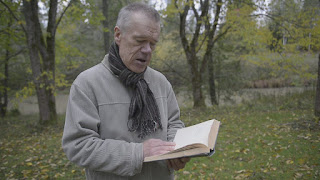I discovered a poem by Risto Rasa during the writing of Surface Displacements. This poem, written in Finnish and published in his book Tuhat Purjetta (trans.: A Thousand Sails) inspired me.
Niin kuin aalto uittaa aallon
yli valtameren,
niin selviydymme mekin toinen toisiamme tukien.
It has been translated like this: Just as one wave carries another / across the ocean / so we too survive, one supporting another. In the translation, the use of the English verb 'carry' is an excellent choice that conveys the intention of the poet.
Rasa used the verb uittaa which means 'to float.' It comes from the verb uida, to swim. It could be said this way: "just as a wave floats another wave over the ocean.... so we too will survive by supporting each other."
It is interesting to me, as a learner of the Finnish language, that 'to carry' in the Finnish language is "kaantaa" and 'to translate' is "kääntää." It is spelled nearly the same, but the vowel changes from a to ä.
Risto Rasa has said that in translation, no poem is exactly the same. Something will be lost. This might be true. It is impossible to carry the definition of a Finnish word into the English language without dropping some of historic or cultural associations.
A filmmaker Matt Carlson created a touching documentary of Risto Rasa: Sielumaisema: The Risto Rasa Project. He has not lost very much about this poet and his work, even though he relied on a translator to interview Rasa. The film has deepened my appreciation of this poet. One realizes how important it is to reveal the poet's landscape and his voice. I recommend that you watch this wonderful film: https://vimeo.com/372123395



%20copy.png)




